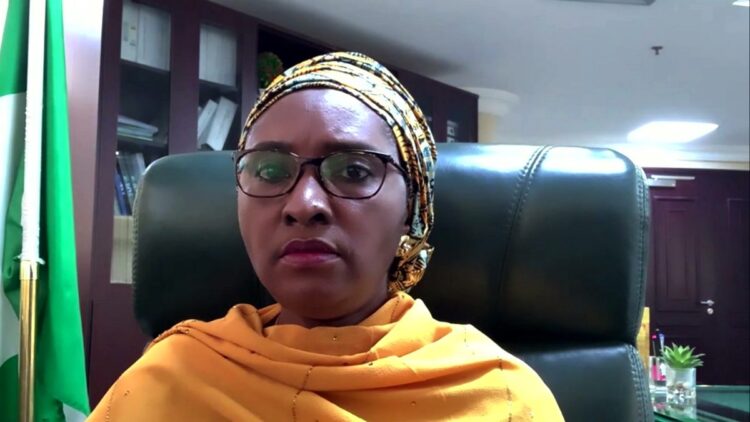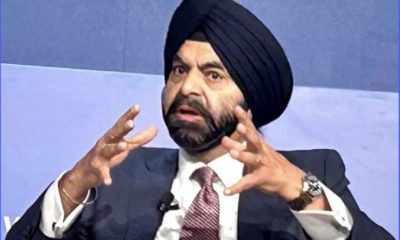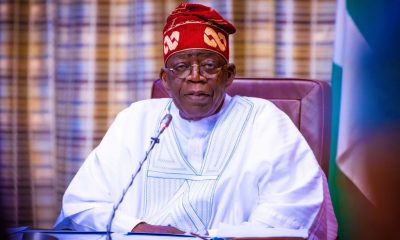Business
Fuel Subsidy: Nigeria Faces Existential Threat- World bank

Fuel Subsidy: Nigeria Faces Existential Threat- World bank
The World Bank on Wednesday raised the alarm that Nigeria might be facing an existential threat.
The warning comes in the wake of Nigeria’s dwindling revenue, the continued payment of trillions of naira on fuel subsidy by the government and the attendant economic challenges it has brought.
The international financial institution warned that if the country failed to optimise its tax system and focus on other areas to boost its revenue, the already low revenue would continue to drop. It noted that despite the rise in the price of oil in the international market, Nigeria had not reaped the benefits because of the huge amount spent on fuel subsidy.
The Senior Public Sector Specialist, Domestic Resource Mobilisation, at the World Bank, Mr Rajul Awasthi, said these at a virtual pre-summit, with the theme ‘Critical Tax Reforms for Shared Prosperity’, organised by the Nigerian Economic Summit Group on Wednesday. He insisted Nigeria would have to eliminate the subsidy regime eventually.
After the Federal Government earmarked about N4tn for subsidy payment in 2022, the Minister of Finance, Budget and National Planning, Mrs Zainab Ahmed, said recently that government might spend a whopping N6.72tn as fuel subsidy in 2023 or pay N3.36tn up to mid-2023 if the subsidy regime would was to end in May 2023.
Also, the minister had consistently said the nation was battling with revenue problems, which had compelled the government to keep borrowing. The debt stock had risen to N41.6tn in the first quarter of 2022 with projections that it could peak at N45tn by the end of the year. Nigeria is rated the fifth on the list of the World Bank’s debtors, with $11.7bn debt stock as of June 30, 2021.
The International Monetary Fund had in March projected that Nigeria might spend 93 per cent of its revenue on debt servicing in 2022, but the minister disclosed a few weeks ago that about 119 per cent of the country’s revenue was spent on debt servicing. This implied that government had to borrow to meet its debt financing obligations, a development many economists had described as disturbing and unsustainable.
The virtual event, anchored by the PwC’s Fiscal Policy Partner and Thematic Lead, NESG Fiscal Policy and Planning Thematic Group, Mr Taiwo Oyedele, was attended by several stakeholders, including the representative of the Manufacturers Association of Nigeria and the Executive Secretary of the Joint Tax Board, Mrs Nana-Aisha Obomeghie.
Meanwhile, in a slide he shared during his presentation, which showed Nigeria’s Development Update, Awasthi explained that between 2015 and 2019, Nigeria’s non-oil revenues were among the lowest in the world and as a result the second lowest in spending, and that oil revenues were also falling even when oil prices were higher.
He stated, “Nigeria has the largest economy in Africa and the largest country in Africa by population, so it is critical to Africa’s progress. There is no doubt about that. But the government of Nigeria, from the public finance perspective, is really facing an existential threat. Let’s not downplay the situation. That is the actual reality.
“Nigeria is 115th out of 115 countries in terms of the average revenue to Gross Domestic Product ratio. Despite the oil prices rising the way they have been, net oil and gas revenues have been coming down because of the tremendous impact of the subsidy.
“So, what is going to happen in 2022? The federation’s revenues are going to be significantly lower. They are already very low, and Nigeria is already the lowest in the world out of 115 large countries and this year, it’s really going to be lower than what it was in 2020 because of the debilitating impact of fuel subsidy.”
On the perennial low revenue from tax in Nigeria, a former Finance Minister and Ahmed’s predecessor, Mrs Kemi Adeosun, had in 2017 revealed that only 214 persons in Nigeria paid N20m and above as tax and that most active taxpayers in the country were people whose PAYE were deducted from source. She had also decried the low tax to GDP ratio at about six per cent, which she described as the lowest in the world and far below the 18 per cent average on the continent.
Speaking on how to get out of the woods, Awasthi stated that in the non-oil sector, Value Added Tax compliance gaps were immense and they needed to be breached as well as rationalise tax expenditures.
Citing the tax expenditure statement of the Budget Office in 2020, he said, “The VAT gap in 2019 was over N3.1tn whereas the collection was N1.2tn. Of that gap, about two-thirds, which is about N2tn, came from compliance gaps. That’s a serious issue that needs to be addressed. It’s because of this that we have a low tax base and a lot of people feel they are being overtaxed.”
He also stressed the need for technology deployment in tax administration and data sharing between the Federal Inland Revenue Service and the states’ Internal revenue services to boost the revenue from personal income tax. He also called for an increase in the tax levied on certain goods, like wine, cigarettes and beer.
He added, “Property taxes at the state and local government levels are also critical. Nigeria has a tremendous potential, with about 50 million households, taxable properties and there are many rich people who need to be paying property taxes. There is a tremendous opportunity there.
“Also, I think there is a huge opportunity to raise excise on goods like beer, wine, spirit and cigarettes. There is a very tiny tax that has been introduced on them and this could be higher. These are the kinds of things that across the world there is a consensus that these rates should be higher because they are supposed to attack and address negative externalities of these products.
“There is also a need to reform the fuel subsidy regime, moving towards its full elimination at least by 2024. Nigeria needs to roll back the PMC subsidies and adopt the free market price. This is critical for this country. There is also the need to improve revenue from cross-border transactions and other international tax measures.”
While calling for increased enlightenment of the taxpayers, which he said the World Bank was collaborating with the World Bank to achieve, he noted that tax laws needed to be modernised and strengthened for a better outcome.
He added, “Going forward, the approach to revenue mobilisation has to be more strategic. We need to be more strategic and it’s not just about taxing more, Nigeria needs to tax better. We need to review the collection system and not just about what to collect and from who. There have been discussions about how the tax system has to be progressive and efficient in terms of compliance and making sure we are targeting the right tax bases.”
In his submission, the Director-General of MAN, Mr Segun Ajayi-Kadiri, represented by the Director of Mr Oluwasegun Osidipe, said there was no doubt that the country needed money but that the government must exercise caution in introducing more taxes.
He tasked the government to expand the tax base, ensure the inclusion of more people in the informal sector and make the tax system progressive such that the rich would pay more than the poor.
Business
Nigeria’s Inflation Drops to 15.10% as NBS Reports Deflationary Trend

Nigeria’s headline inflation rate declined to 15.10 per cent in January 2026, marking a significant drop from 27.61 per cent recorded in January 2025, according to the latest Consumer Price Index (CPI) report released by the National Bureau of Statistics.
The report also showed that month-on-month inflation recorded a deflationary trend of –2.88 per cent, representing a 3.42 percentage-point decrease compared to December 2025. Analysts say the development signals easing price pressures across key sectors of the economy.
Food inflation stood at 8.89 per cent year-on-year, down from 29.63 per cent in January 2025. On a month-on-month basis, food prices declined by 6.02 per cent, reflecting lower costs in several staple commodities.
The data suggests a sustained downward trajectory in inflation over the past 12 months, pointing to improving macroeconomic stability.
The administration of President Bola Ahmed Tinubu has consistently attributed recent economic adjustments to ongoing fiscal and monetary reforms aimed at stabilising prices, boosting agricultural output, and strengthening domestic supply chains.
Economic analysts note that while the latest figures indicate progress, sustaining the downward trend will depend on continued policy discipline, exchange rate stability, and improvements in food production and distribution.
The January report provides one of the clearest indications yet that inflationary pressures, which surged in early 2025, may be moderating.
Bank
Alpha Morgan to Host 19th Economic Review Webinar

Alpha Morgan to Host 19th Economic Review Webinar
In an economy shaped by constant shifts, the edge often belongs to those with the right information.
On Wednesday, February 25, 2026, Alpha Morgan Bank will host the 19th edition of its Economic Review Webinar, a high-level thought leadership session designed to equip businesses, investors, and individuals with timely financial and economic insight.
The session, which will hold live on Zoom at 10:00am WAT and will feature economist Bismarck Rewane, who will examine the key signals influencing Nigeria’s economic direction in 2026, including policy trends, market movements, and global developments shaping the local landscape.
With a consistent track record of delivering clarity in uncertain times, the Alpha Morgan Economic Review continues to provide practical context for decision-making in a dynamic environment.
Registration for the 19th Alpha Morgan Economic Review is free and can be completed via https://bit.ly/registeramerseries19
It is a bi-monthly platform that is open to the public and is held virtually.
Visit www.alphamorganbank to know more.
Business
GTBank Launches Quick Airtime Loan at 2.95%

GTBank Launches Quick Airtime Loan at 2.95%
Guaranty Trust Bank Ltd (GTBank), the flagship banking franchise of GTCO Plc, Africa’s leading financial services group, today announced the launch of Quick Airtime Loan, an innovative digital solution that gives customers instant access to airtime when they run out of call credit and have limited funds in their bank accounts, ensuring customers can stay connected when it matters most.
In today’s always-on world, running out of airtime is more than a minor inconvenience. It can mean missed opportunities, disrupted plans, and lost connections, often at the very moment when funds are tight, and options are limited. Quick Airtime Loan was created to solve this problem, offering customers instant access to airtime on credit, directly from their bank. With Quick Airtime Loan, eligible GTBank customers can access from ₦100 and up to ₦10,000 by dialing *737*90#. Available across all major mobile networks in Nigeria, the service will soon expand to include data loans, further strengthening its proposition as a reliable on-demand platform.
For years, the airtime credit market has been dominated by Telcos, where charges for this service are at 15%. GTBank is now changing the narrative by offering a customer-centric, bank-led digital alternative priced at 2.95%. Built on transparency, convenience and affordability, Quick Airtime Loan has the potential to broaden access to airtime, deliver meaningful cost savings for millions of Nigerians, and redefine how financial services show up in everyday life, not just in banking moments.
Commenting on the product launch, Miriam Olusanya, Managing Director of Guaranty Trust Bank Ltd, said: “Quick Airtime Loan reflects GTBank’s continued focus on delivering digital solutions that are relevant, accessible, and built around real customer needs. The solution underscores the power of a connected financial ecosystem, combining GTBank’s digital reach and lending expertise with the capabilities of HabariPay to deliver a smooth, end-to-end experience. By leveraging unique strengths across the Group, we are able to accelerate innovation, strengthen execution, and deliver a more integrated customer experience across all our service channels.”
Importantly, Quick Airtime Loan highlights GTCO’s evolution as a fully diversified financial services group. Leveraging HabariPay’s Squad, the solution reinforces the Group’s ecosystem proposition by bringing together banking, payment technology, and digital channels to deliver intuitive, one-stop experiences for customers.
With this new product launch, Guaranty Trust Bank is extending its legacy of pioneering digital-first solutions that have redefined customer access to financial services across the industry, building on the proven strength of its widely adopted QuickCredit offering and the convenience of the Bank’s iconic *737# USSD Banking platform.
About Guaranty Trust Bank
Guaranty Trust Bank (GTBank) is the flagship banking franchise of GTCO Plc, a leading financial services group with a strong presence across Africa and the United Kingdom. The Bank is widely recognized for its leadership in digital banking, customer experience, and innovative financial solutions that deliver value to individuals, businesses, and communities.
About HabariPay
HabariPay is the payments fintech subsidiary of GTCO Plc, focused on enabling fast, secure, and accessible digital payments for individuals and businesses. By integrating payments and digital technology, HabariPay supports innovative services that make everyday financial interactions simpler and more seamless.
Enquiries:
GTCO
Group Corporate Communication
[email protected]
+234-1-2715227
www.gtcoplc.com
-

 celebrity radar - gossips6 months ago
celebrity radar - gossips6 months agoWhy Babangida’s Hilltop Home Became Nigeria’s Political “Mecca”
-

 society6 months ago
society6 months agoPower is a Loan, Not a Possession: The Sacred Duty of Planting People
-

 society5 months ago
society5 months agoReligion: Africa’s Oldest Weapon of Enslavement and the Forgotten Truth
-

 news6 months ago
news6 months agoTHE APPOINTMENT OF WASIU AYINDE BY THE FEDERAL GOVERNMENT AS AN AMBASSADOR SOUNDS EMBARRASSING










